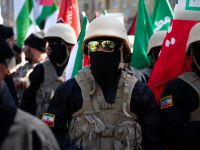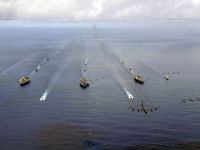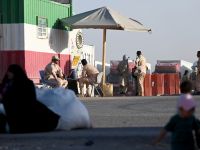Saudi Arabia is backing calls for an emergency Arab summit to discuss the latest flare-up of violence in the Palestinian territories, officials and diplomats said Thursday.
Saudi officials said the Gulf regional superpower supported an Arab summit, because it "urgent or extraordinary", but added that the kingdom had "received no official invitation to take part in any summit."
Egyptian President Hosni Mubarak called Thursday for an emergency summit before the end of October to discuss the "deteriorating situation" in the Palestinian territories.
Mubarak and his Syrian counterpart, Bashar al-Assad, issued a joint appeal in Cairo on Monday for a summit of Arab leaders to deal with the bloody clashes that began last week and have so far left 73 dead, most of them Palestinians.
Mubarak said then that Egypt was ready "to host a summit immediately," but added it would probably take three months to organize.
"Riyadh supports holding an urgent summit concentrating on the situation in the Palestinian territories, but it is also favorable to an ordinary Arab summit to debate the circumstances of the Arab world," a Saudi official told AFP.
A Palestinian diplomat said "senior Saudi officials have asked the Palestinian Authority to outline its expectations of a summit and the nature of the support it is hoping for."
A meeting of Arab foreign ministers is already scheduled for October 21-22, but Mubarak appeared to want it held sooner to allow the summit to follow before the end of the month.
On Tuesday the Arab League backed the call for an emergency summit.
"This summit will be a historic step in the process of Arab solidarity with Jerusalem and a clear message of Arab rejection of the Israeli occupation of the holy city and territories occupied in 1967," said the league's secretary general, Esmat Abdel Meguid.
Since the 1991 Gulf War, following Iraq's invasion of Kuwait and the resultant opening of a deep rift in the Arab world, only one Arab summit has been held. That was in 1996, and Iraq was not invited.
Since then, several Arab capitals have tried in vain to hold a summit, notably during the US-British air raids on Iraq in December 1998.
But certain Arab heads of state insisted at each attempt on the need to prepare well before a summit could be held, effectively scuppering the attempt.
Saudi Foreign Minister Prince Saud al-Faisal will visit Iran on Saturday for talks on the latest Middle East violence.
Iranian President Mohammad Khatami, current head of the Organization of the Islamic Conference (OIC), on Wednesday called for an urgent meeting of the group's foreign ministers to coordinate policy against Israel.
Bahrain, Kuwait, Lebanon, Qatar and the United Arab Emirates have all come out in favor of a summit, proposed by Egypt and Syria, along with Jordan and the Palestinians – RIYADH (AFP)
© 2000 Al Bawaba (www.albawaba.com)







